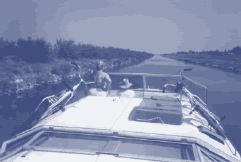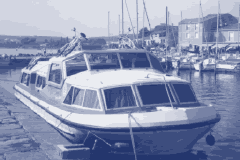|
Read
here about the adventures and romance of barging the canals of
France by two fellow WTA members. Their accounting of their trip
offers objective info to help you plan your trip. At the end of the
article we've provided a summary of who to contact for your easy
reference. Enjoy!
Canals of
France

Cruising Canal Du Rhone
The canals of France have played a major
role in the commercial history of Europe and in the dreams of travelers
for centuries. One of the earliest visionaries was Baron Paul Riquet, a
farmer and tax collector from the province of Languedoc, who sold a plan
to Louis XIV's minister Colbert which would ultimately link the Gulf of
Lions in the western Mediterranean with the Bay of Biscay on the Atlantic.
Built by 12,000 laborers who started digging in 1666, the Canal du Midi
stretches 235 kilometers from the city of Toulouse on the Garonne River to
the Mediterranean port of Sete. It's an engineering wonder, tunnelling
into hillsides, crossing rivers and rising and falling through more than
100 locks across some of the most scenic, tranquil and history-laden
landscape in the world.
One of Louis' reservations about a canal
between the two seas was the access it provided to English adventurers
into his country's heartland. And of course, le Roi was right as usual.
Foreign invaders are now so ubiquitous throughout the country's
spectacular waterways that virtually every Guide Fluvial is written in
French, English and German, and the canals have become rivers of Babel.
Some familiarity with French is helpful, of course, but today's traveler
can get along just fine without a word of the language. Americans
especially are greeted with warm hospitality.
Some familiarity with boats and seamanship
may be helpful as well, but again is not a necessity. Do-it-yourself canal
barging is slower, safer, more comfortable and, at a top speed of 6-8
miles per hour, vastly more forgiving of a novices' mistakes than say, a
couple of rush hour laps on the Champs-Elysees.
Regardless of your boating experience on
canals in France or elsewhere, a Carte de Plaisance, or captain's license,
must be specially issued to one member of your group for the duration of
each trip, and that member must be on-board whenever the boat is in
motion. It is most commonly issued by the charter company after a quick
lesson in boat handling at the start of the cruise. Generally, the level
of instruction you receive will depend upon your boating experience.
Two American couples, members of WTA, who
teamed up for a shared charter from the Crown Blue Line (tel. 011 33 467
90 91 70) reported the basics of a typical week-long cruise from Port
Cassafieres to St. Gilles, a leisurely journey of only about 100 miles
that began on the east end of the Canal du Midi and terminated near the
southwest end of the Canal du Rhone a Sete.
Their Commander 6 canal boat measured 42'
long by 12' wide with a 3' draft. It had three staterooms with bureaus and
closets, two heads (bathrooms with showers), a salon and an austere but
serviceable galley. The cockpit had a crank-open convertible roof.
There were only three locks in the stretch
of water they chose for their charter, and their transits were simple,
swift and convenient. They also easily coped with a variety of bridges.
Within the canals, a turn can be made on
the boat's own length simply by using forward and reverse gear with a
maximum turn of the wheel - or with the bow against a soft bank.
From start to finish, the journey was an
adventure and a delight. Their transit of the lake Etang de Thau offered
an interval of open-water cruising, and at night they had a choice of
docking among a number of the immaculately preserved medieval walled
towns, modern marinas, or the serene solitude (and safety) of an ad hoc
tie-down along the canal banking.
Canal bargers are no more bound to their
boats than drivers to their cars. Day trips on land included easy
excursions by bicycle, bus or even on foot to a wide variety of nearby
white-sand beaches, some crowded with vacationers of every tongue and hue,
others as solitary and serene as the shores of Eden.
Three of the four travelers were also
gourmet cooks, so the quartet feasted royally from their own galley,
provendered from the many rich and colorful markets that dotted their
route, or dined out on such French Mediterranean specialties as pates,
smoked fish, mussels, oysters, sea escargots (larger than the land
variety) or roast duck in the surprisingly affordable restaurants, seldom
over $20 for a 5-course dinner with each course nearly a meal in itself,
including wine.
On balance, the overall trip was a bargain
as well. The biggest item was the charter. They also elected to rent four
bikes from the boat broker, for those short trips through the local byways
or to the shore. All inclusive, with fuel, insurance, bikes, and other
extras, barge charter costs were $2,100. For a group of six, which the
boat can handle at its maximum, this reduces to $350 per passenger.

The Commander 6 docked at a canal pier
Because on-board navigation aids were
nonexistent, our correspondents suggested a reliable suction cupped,
dash-mounted, automobile compass and a small pair of binoculars. Also
recommended was a cellular telephone, available with voice mail from
Cellhire USA, Inc. (1-888-476-7368) at $8/day and $2.70/minute to the
States from anywhere in France.
One other caution: if you plan to rent a
car at St. Gilles, make sure you specify which St. Gilles you have in
mind; there is more than one in France, and they're a few hundred miles
apart.
To book your trip, you can contact your
travel agent or any of these French booking companies: Crown Blue Line
(tel. 011 33 467 90 91 70) and Locaboat Plaisance (tel. 011 33 386 91 72
72).
Places to Stay, Eat, and Other Contact Information
- Crown
Blue Line - phone: 011 33 467 90 91 70
- Locaboat
Plaisance - phone: 011 33 386 91 72 72
- Cellular
Telephone from Cellhire USA, Inc. - phone:
1-888-476-7368
Notice: This information is current as of
November 1999. It is recommended that you contact the numbers, and/or
visit the websites above to determine any changes to the
information.
|